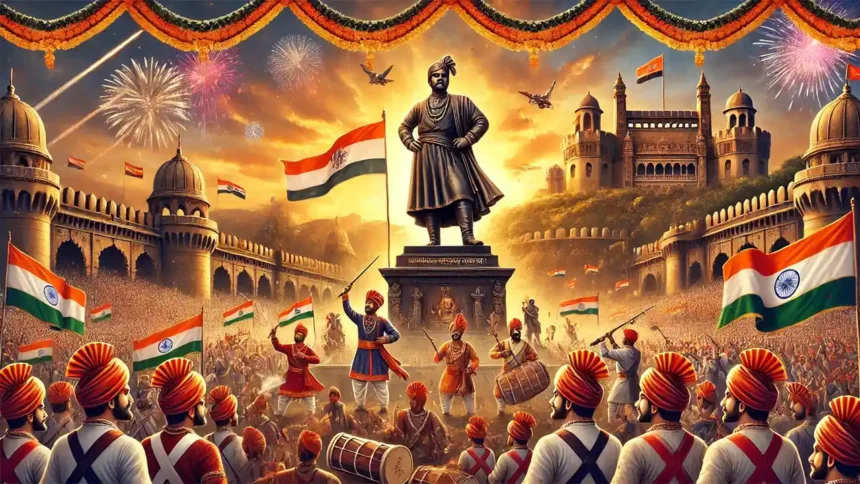Chhatrapati Shivaji Maharaj Jayanti: The Untold Stories of the Warrior King Who Shaped India
Chhatrapati Shivaji Maharaj Jayanti is not just a day of celebration; it is a day to remember and honor one of India’s greatest warriors, leaders, and visionaries. Born on February 19, 1630, Shivaji Maharaj was a Maratha king who founded the Maratha Empire in western India. His legacy is not just about battles and conquests but also about his innovative administration, respect for all religions, and his unwavering commitment to justice and equality.
Every year, on his birth anniversary, millions of people across India, especially in Maharashtra, celebrate Shivaji Maharaj Jayanti with great enthusiasm. But who was Shivaji Maharaj, and why is he still remembered and revered centuries after his time? Let’s dive into the life, achievements, and legacy of this legendary king.
The Early Life of Shivaji Maharaj
Shivaji Maharaj was born in the hill fort of Shivneri, near the city of Junnar in present-day Pune district. His father, Shahaji Bhosale, was a Maratha general who served the Deccan Sultanates, and his mother, Jijabai, was a deeply religious and strong-willed woman who played a significant role in shaping Shivaji’s character.
From a young age, Shivaji was inspired by the stories of Hindu epics like the Ramayana and Mahabharata. His mother instilled in him a sense of pride in his heritage and a desire to fight against injustice. By the age of 16, Shivaji had already captured his first fort, Torna, marking the beginning of his journey to establish an independent Maratha kingdom.
The Rise of the Maratha Empire
Shivaji Maharaj was not just a warrior; he was a brilliant strategist. He realized that the mountainous terrain of the Western Ghats could be used to his advantage in guerrilla warfare. With a small but highly disciplined army, he began capturing forts and expanding his territory.
One of his most significant achievements was the establishment of a naval force, which was rare for Indian rulers at that time. He understood the importance of controlling the coastline to protect his kingdom from foreign invaders. His navy not only safeguarded the Maratha Empire but also challenged the dominance of European powers like the Portuguese and British.
Administrative Reforms and Governance
Shivaji Maharaj was not just a conqueror; he was also a visionary administrator. He introduced several reforms that were ahead of his time. His administration was based on the principles of decentralization, where local self-governance was encouraged. He divided his kingdom into provinces, each governed by a viceroy, and ensured that the revenue system was fair and transparent.
He also promoted the use of Marathi and Sanskrit in his court, giving importance to local languages and culture. His council of ministers, known as the Ashtapradhan, was responsible for various aspects of governance, including finance, defense, and foreign affairs.
Respect for All Religions
One of the most remarkable aspects of Shivaji Maharaj’s rule was his respect for all religions. At a time when religious intolerance was common, Shivaji treated people of all faiths equally. He had Muslim soldiers in his army and even appointed Muslims to high positions in his administration. He protected Hindu temples as well as mosques and ensured that his subjects could practice their religion freely.
This secular approach earned him the respect and loyalty of people from different communities. His famous encounter with the Sufi saint, Baba Yaqut, is often cited as an example of his tolerance and respect for all faiths.
The Coronation of Chhatrapati Shivaji Maharaj
In 1674, Shivaji Maharaj was crowned as the Chhatrapati (emperor) of the Maratha Empire in a grand ceremony at Raigad Fort. This coronation was not just a formal event; it was a declaration of his sovereignty and his vision for an independent Hindu kingdom. The title “Chhatrapati” symbolized his role as a protector of his people and their culture.
The coronation ceremony was conducted according to Hindu traditions, and Shivaji Maharaj took an oath to uphold justice and righteousness. This event marked the culmination of his lifelong struggle to establish a strong and self-reliant Maratha state.
The Legacy of Shivaji Maharaj
Shivaji Maharaj passed away in 1680, but his legacy continues to inspire millions. He is remembered not just as a warrior but as a symbol of courage, wisdom, and good governance. His life and achievements have been celebrated in literature, art, and cinema, and his forts and monuments stand as a testament to his greatness.
Every year, on Shivaji Maharaj Jayanti, people pay tribute to this great leader by organizing processions, cultural programs, and educational events. Schools and colleges hold competitions like essay writing and debates to educate the younger generation about his contributions.
Why Shivaji Maharaj Jayanti Matters Today
In today’s world, where values like justice, equality, and good governance are more important than ever, Shivaji Maharaj’s life offers valuable lessons. His emphasis on local self-governance, his respect for all religions, and his innovative military strategies are still relevant.
Shivaji Maharaj Jayanti is not just a day to remember the past; it is a day to reflect on how we can apply his principles to build a better future. Whether it is standing up against injustice, promoting cultural pride, or working for the welfare of all, Shivaji Maharaj’s legacy reminds us of the power of determination and vision.
FAQs About Chhatrapati Shivaji Maharaj Jayanti
1. When is Chhatrapati Shivaji Maharaj Jayanti celebrated?
Chhatrapati Shivaji Maharaj Jayanti is celebrated on February 19 every year to mark the birth anniversary of the great Maratha king.
2. Why is Shivaji Maharaj called Chhatrapati?
The title “Chhatrapati” means “emperor” or “paramount sovereign.” Shivaji Maharaj was crowned as Chhatrapati in 1674, symbolizing his role as the protector of his people.
3. What are some of Shivaji Maharaj’s major achievements?
Shivaji Maharaj founded the Maratha Empire, introduced innovative administrative reforms, established a strong naval force, and promoted religious tolerance.
4. How is Shivaji Maharaj Jayanti celebrated?
The day is celebrated with processions, cultural programs, and educational events. People also visit forts and monuments associated with Shivaji Maharaj.
5. What lessons can we learn from Shivaji Maharaj’s life?
Shivaji Maharaj’s life teaches us the importance of courage, justice, good governance, and respect for all cultures and religions.









